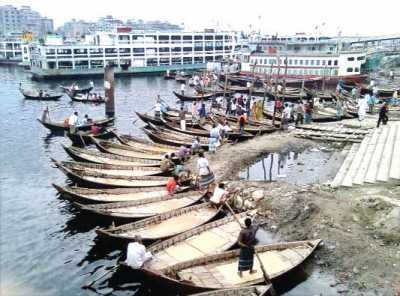The Buriganga River is now the synonym of a dumping ground. Severe pollution has turned this once vibrant river into the biggest drain of Bangladesh. The present condition of the river is not a silent suicidal process rather it is a clear-cut murder. Because of rapid population, industrial, urban and economic growth, the river is biologically dead. Though Bangladesh is a land of rivers but interestingly we do not have river governance; what we have is just poor river management system. Many development projects have taken on the label of “Save Buriganga” but there is hardly any achievement and river water remains polluted. One side of the coin shows the administration is cleaning the waste, whereas other side shows the river remains terribly polluted. These contradictory scenes raise the question — whether the river management system is working or not.
By Md. Sariful Islam, Department of Development Studies, University of Dhaka
The owners of the tannery factories are defying laws by bribing the corrupt officials. The authorities concerned have so far failed to keep eyes on influential people who are trying to grab the river. Some corrupt government officials help the illegal land grabbers and take advantages by abusing their power as there is lack of transparency, accountability, effectiveness and weak monitoring system. Are we satisfied with this existing river management system for Buriganga? If not, what could be the probable solution? The present situation requires new policy, institutional change, efficiency, transparency, accountability, responsibility, empowerment of local community, and active participation of the stakeholders — in a word good governance.
By focusing only on the management, we are bypassing the core factor that is governance. Absence of good governance keeps making the management system weaker. When governance is weak and corrupted, expecting a good river management is nothing but absurd. Poor river governance results in degradation and loss of biodiversity. To have a sustainable river management, the first and foremost tasks are the management of the people, institutions, structures and policies, not the management of water restoration. These factors can be managed only through sustainable and good governance. The role of governance is to set the rules so that the management can run well and act in the right direction to achieve its objectives transparently in an effective way. Crisis of good governance has made the management system fail. So, it is high time to focus on it and to introduce sustainable river governance.
River governance sets the rules for water resource and waste management for a river and thus effective and sustainable river governance ensures the use of the resources more productively and blocks a fatal drain on resources. By taking unplanned development policies to free the river from pollution, it will be nothing but a waste of money. Unplanned development policies and activities, lack of transparency and accountability, weak implementation and monitoring system are clearly indicating the existence of poor governance and to some extent no governance nowadays. Effective river governance combines different levels of government along with the development partners and brings them under an umbrella to govern the river sustainably. Governance is a coordinated process of various dimensions. An effective coordination of these dimensions can ensure a sustainable river governance framework. The issue of sustainable river governance must be given importance to make a real difference.
Needless to say it is important to have sustainable river governance but we cannot overcome all the current difficulties overnight; what we need is a solid start in the right direction right now. We must not go for doing everything everywhere; we just need to do the right things in the right places at the right time. We should not put off till tomorrow what can be done today. Lack of manpower, bureaucratic complexity, shortage of capacities, lack of coordination among the government bodies, inefficiency, corruption, centralisation of the capital, and of course inattentiveness of us are some of the main challenges to impart river governance. Lack of cohesion among the government bodies and other development partners remains a crucial challenge. In such a situation, there is no alternative except introducing fair and sustainable river governance before we reach a point of no return.
This is not a fanciful vision to introduce a sustainable river governance in our country but it would be an unrealistic thought to go for zero water pollution in the Buriganga at this very moment because we cannot shut down all our mills, factories, tanneries which are continuously making contribution to take the river on the verge of death. However, we can introduce such a governance that no one would dare to pollute the river and violate the laws. Keeping hole at the bottom and pouring water into cistern will never fill up a container. So, firstly we must have to go for a planned development policy, taking actions against the polluters and land grabbers. After that we can go for restoration of water. All the government levels regarding the river governance issue need to be merged and re-examined to make the output fruitful. The government needs to create a ‘River Watch’ group that will always monitor the issues of the river and keep updating the policy framework regarding the effectiveness and sustainability of river governance. Strategic approach, efficient operation, continuous improvement, active stakeholder participation, proper implementation of laws, consistency and coherence in policy formation are a must for the sustainability of river governance.
Last but not the least everyone has a role to play to make the river smile. The responsibility is not only of the government but also of everyone. For good governance, it is said to act from “local to national” but now it is time to say from “self to national”. Without committed citizens it is impossible to inject life into the dead river. So let’s join hand in hand to make the river alive and to turn it into a great resource.






